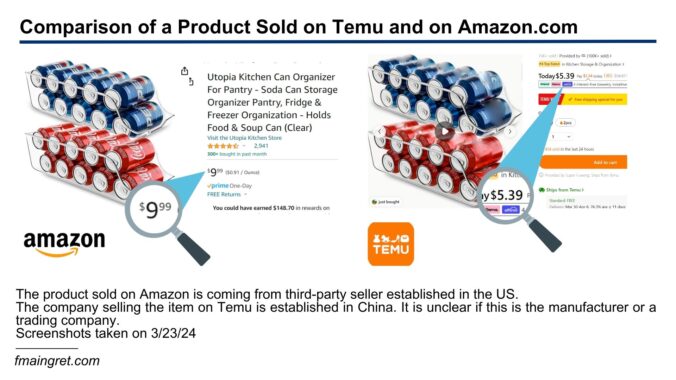Do you feel guilty ordering clothes from Shein? If so, you’re not alone. Thousands of social media users are voicing their concerns about the impact on the environment and the labor practices of the Chinese giant, criticizing influencers’ “Shein hauls.”
Yet, Shein is more popular than ever, with over 250 million app downloads in 2023. The sheer volume of clothing sold and the resulting waste are reasons why some consumers are becoming concerned. But consumers are not the only ones worried: businesses and the government seem to be taking the threat seriously, with France’s parliament backing measures to make fast fashion less attractive to buyers.
Of course, governments say they want to support more sustainable practices. But is saving the environment the only reason behind these potential new regulations? Following the massive success of China-based shopping apps, could we see similar regulations expand to industries beyond just fast fashion?
Is France Taking Action Against Fast-Fashion, or Against Chinese Online Retailers?
I love going to thrift stores, hoping to find high-end clothes and shoes at a heavily discounted price. One of my worries is to see my favorite stores flooded with low-quality, fast-fashion items in the next few years. The amount of cheaply made products Shein sells is through the roof, from $1.4B in 2018 to a forecasted $48B in 2024. In terms of purely online sales, Shein trumps Zara.com, Hm.com, and Zalando combined.
Some industry experts call Shein the epitome of ultra-fast fashion: the company is able to produce thousands of different designs per day. We used to have trends that lasted years, before the fast-fashion industry caused trends to only last a couple of months. Now, thanks to Shein strategy, supercharged by TikTok and Instagram influencers, trends barely last a couple of weeks. You’re not one of the cool kids anymore if you wear something weeks after you buy it, how crazy is that?
Every year, people in the United States throw away over 34 billion pounds of used textiles, more than 100 pounds per person and per year. That is heavier than a large male golden retriever. Every year and per person. And unlike timeless items that can be resold, no one will want to buy outdated designs. Finally, the impact of logistics is huge: Shein and Temu together send almost 600,000 packages to the U.S. every day, and that number keeps increasing.
But let’s go back to France. France’s proposed regulation is based on several criteria, including the volumes of clothes produced and the turnover speed of new collections. That is how a business would be classified as “fast-fashion”. In a typical French manner where new taxes are the answer to every problem, a surcharge would be applied if the law passes: 5 euros per item (about $5.50) next year and 10 euros in 2023. In addition to the surcharge, producers would have to inform consumers about the environmental impact of their products.
I absolutely think something must be done to limit the impact of this industry on the environment. However, I believe the environment isn’t the main reason why lawmakers are now concerned about fast-fashion. As you can see on the chart above (on the right), the amount of textile sent to landfills keeps increasing since 1960, but we can see a much sharper increase since 1990, with no sign of slowing down. With the amount of waste increasing by about 50% every decade, why are politicians only concerned now? Is it because Shein contributes to an even steeper increase in textile waste? Because people are more aware and sensitive on environmental issues? Or because Shein is taking away market share from local retailers, destroying jobs and hurting local economies?
It is unclear how a company will be classified under this new regulation. It is true that releasing thousands of new designs per day contributes to making clothes unfashionable within weeks. But if that is the main criteria, this would make me think the law is specifically targeting Shein over other companies. Is it that H&M and Zara don’t want to create too many designs to not produce waste, or are they simply unable to do so? The design and release of so many new items per day is, alongside its low prices, Shein’s greatest asset. The company is able to quickly identify fashion trends, and minimize manufacturing cycles to the point no other company can compete, especially those with more complex supply chains and networks of retail stores.
Even if protecting local businesses is the main motivation behind these new regulations, I believe it can have a positive impact on the environment. A 5 to 10 euros tax is steep, even if capped at 50% of the item retail price. However, I am not sure this will be enough. The problem is obviously complex. Government can’t limit customers in how much clothes they want to buy, social media is a very powerful marketing machine, and sustainable items are simply unaffordable for many people. Still, it is a first step towards more sustainable practices and helps build awareness on these issues.
When I first heard about it, I wondered if we will see similar initiatives in other countries, but more importantly if these regulations extended to other industries beyond just fast fashion.
What About Other Industries?
The fashion industry isn’t the only one where a large Chinese company sees their sales skyrocket in the US and other western countries. There is now one company no one can ignore, that spent about $15M on Superbowl commercials. Temu surged from $3 million in sales in September 2022 to $1 billion in June 2023, and became one of the most downloaded apps in the U.S.
Some politicians in the U.S are even calling for a ban of the Chinese app, stating “US manufacturers can’t compete with low-cost competitors that rely on forced labor”. Sens. Sherrod Brown (D-Ohio) and Rick Scott (R-Fla.) have sent a letter to Biden calling on him to end the duty-free treatment for products sold through Temu. “This out-of-control problem impacts the safety and livelihoods of Americans, outsourcing not only our manufacturing, but also our retail sectors to China, which — as you know — systematically utilizes slave labor among other unconscionable practices to undermine our economy,” the senators said.
Whether the accusations made are true or not, this got me thinking, are US politicians concerned about the use of slave labor and safety issues, or do they care more about protecting US corporations? Why would it be unethical for Temu to sell a product to US consumers, but it is okay if a US middleman sells the same product, coming from the same factory, on Amazon?
I believe protecting local businesses is important, no foreign company should have an unfair advantage over local ones, and the use of forced labor would be a huge problem if true. However, consumers must know that buying on Amazon at a higher price does not guarantee a more ethical, or a higher quality item.
And people are becoming aware of it, with product reviews, “Dupes” and “Temu hauls” being posted all over TikTok. People are becoming able to buy directly from manufacturers, skipping the middleman. I believe this will have a huge impact on US businesses in the upcoming years, and may prompt politicians to emulate France and establish new regulations. Before this happens, US businesses are already adapting to the changing business environment and consumer habits. For example, Amazon recently dropped its referral fees for low-priced fashion items, a measure to better compete with Shein.
Conclusion
Only time will tell what will happen next. France’s move to tax fast fashion may reflect growing concerns not only about environmental sustainability. But it seems clear that politicians care about the broader economic impact of Chinese companies like Shein.
While the environmental implications are significant, the regulations also aim to level the playing field for local businesses and address ethical concerns related to labor practices. I wouldn’t be surprised if we saw similar initiatives in other countries, targeting a broader range of industries, in the near future.

